Cremation, Caste, and Cosmogony in Karmic Traditions.
Cremation, Caste, and Cosmogony in Karmic Traditions.
Cremation, Caste, and Cosmogony in Karmic Traditions.
You also want an ePaper? Increase the reach of your titles
YUMPU automatically turns print PDFs into web optimized ePapers that Google loves.
discourse through the giv<strong>in</strong>g <strong>and</strong> receiv<strong>in</strong>g of<br />
prestations, <strong>and</strong> this has to be seen from the perspective<br />
of “ritual centrality”, or who is at the conceptual centre<br />
of village ritual organisation (ibid:248). “Hierarchy, as<br />
an aspect of <strong>in</strong>tercaste relations, is not the foregrounded<br />
aspect of the social situation <strong>in</strong> the context of the giv<strong>in</strong>g<br />
of dan” (ibid:202).<br />
The giv<strong>in</strong>g of dan <strong>in</strong> ritual contexts is always said to<br />
promote well-be<strong>in</strong>g <strong>and</strong> auspiciousness through the<br />
transference of “evilness”, “<strong>in</strong>auspiciousness”, <strong>and</strong><br />
“afflictions” from the donor to the receiver. The dangers<br />
of these transactions have significance for an<br />
underst<strong>and</strong><strong>in</strong>g of <strong>in</strong>ter-caste relations. The acceptance of<br />
dan is dangerous for all castes, <strong>and</strong> hence, hierarchies<br />
are not straightforward <strong>in</strong> the classical way Dumont has<br />
described (Raheja 1988, 1990). The poison <strong>and</strong><br />
purification of the gift is a paradox from a religious <strong>and</strong><br />
eschatological po<strong>in</strong>t of view. “Gods receive offer<strong>in</strong>gs<br />
from men, but return them, imbued with their own<br />
substance <strong>and</strong> powers, <strong>and</strong> the transactions are thus<br />
unequal, with the deity reciprocat<strong>in</strong>g <strong>in</strong> a higher<br />
medium” (Raheja 1988:68). There is also another<br />
problem with the giv<strong>in</strong>g of dan, which may have a<br />
negative feedback on the donor. The recipient must be<br />
worthy of the gift. If the Brahman spends the money he<br />
received from the donor on prostitutes, gambl<strong>in</strong>g or<br />
alcohol, the s<strong>in</strong>s committed are as much the donor’s as<br />
the receiver’s (Parry 1980:103).<br />
Real sadhus look upon the receiv<strong>in</strong>g of money for their<br />
religious duties as <strong>in</strong>auspicious, <strong>and</strong> they will not accept<br />
them directly, but only <strong>in</strong>directly receive them <strong>in</strong> their<br />
vessel, altar, etc. Thus, the Indian gift <strong>and</strong> its ideology<br />
differ from the Maussian ideas of the gift, <strong>and</strong> <strong>in</strong> Manu<br />
there is written explicitly a rule which prohibits the<br />
return of these gifts. “The gift threatens to cement the<br />
two together <strong>in</strong> a dangerous <strong>in</strong>terdependence; but every<br />
attempt is made to sever their bond by <strong>in</strong>sist<strong>in</strong>g on the<br />
complete alienation of the th<strong>in</strong>g. Under no<br />
circumstances, <strong>and</strong> on pa<strong>in</strong> of terrible supernatural<br />
penalties, is the gift resumed. Its evil “spirit” must not<br />
come back”, Parry argues, “While Mauss orig<strong>in</strong>ally<br />
60<br />
<strong>in</strong>troduced this notion of “spirit” to expla<strong>in</strong> the<br />
<strong>in</strong>alienability of the object <strong>and</strong> the necessity of mak<strong>in</strong>g a<br />
return, what it <strong>in</strong> fact expla<strong>in</strong>s <strong>in</strong> this context is why the<br />
gift must be alienated, should never return, <strong>and</strong> should<br />
endlessly be h<strong>and</strong>ed on” (Parry 1986:461). The problem<br />
with Mauss’ analysis seems therefore to be that there are<br />
differences between religions <strong>in</strong> small-scale tribal<br />
societies <strong>and</strong> world religions. It is possible with an<br />
ideology of a “pure gift” <strong>in</strong> this life, <strong>in</strong> an ethicised<br />
salvation religion where the ideal goals are <strong>in</strong> the next<br />
world. Consequently, it is important to dist<strong>in</strong>guish<br />
between the expectation of an immediate return here <strong>and</strong><br />
now, <strong>and</strong> the unreciprocated gifts, which aim to be the<br />
liberation from this bondage <strong>and</strong> world, if they are given<br />
without hope <strong>and</strong> only of free will (ibid:466-468).<br />
F<strong>in</strong>ally, “uncleanness or dirt is that which must not be<br />
<strong>in</strong>cluded if a pattern is to be ma<strong>in</strong>ta<strong>in</strong>ed” (Douglas<br />
1994:41). Defilement is never an isolated event because<br />
ideas of pollution make sense only by reference to a total<br />
structure (ibid:42). The concerns of purity, pollution, <strong>and</strong><br />
the transfer of s<strong>in</strong>s are <strong>in</strong>evitably connected to the law of<br />
karma, theories of s<strong>in</strong>s, <strong>and</strong> social organisation <strong>in</strong> terms<br />
of castes. Holy men are be<strong>in</strong>g acknowledged as holy<br />
because of their capability of transform<strong>in</strong>g impurity <strong>in</strong>to<br />
purity. The paradox is that the process creat<strong>in</strong>g their<br />
supremacy is also the threat to their status. If sadhus or<br />
priests are unable to purify themselves, then they lose<br />
their status, <strong>and</strong> as such it is the process of purification<br />
that guarantees their status.<br />
With this debate on transactions <strong>and</strong> digestions of s<strong>in</strong>s I<br />
will return to the Mahabrahmans <strong>and</strong> the previous<br />
discussion of k<strong>in</strong>gs, katto-rituals, <strong>and</strong> constructions of<br />
castes. I have shown that be<strong>in</strong>g pure is not necessarily a<br />
matter of distanc<strong>in</strong>g oneself from impurity, but more<br />
importantly <strong>in</strong> religious terms, to transform impurity <strong>in</strong>to<br />
purity. These considerations <strong>and</strong> processes are<br />
<strong>in</strong>corporated <strong>in</strong>to the caste system as an organisation<br />
structur<strong>in</strong>g real practices, <strong>and</strong> hence, it is possible to<br />
comb<strong>in</strong>e all these considerations <strong>in</strong>to an underst<strong>and</strong><strong>in</strong>g<br />
of pr<strong>in</strong>ciples of castes <strong>in</strong> practice.


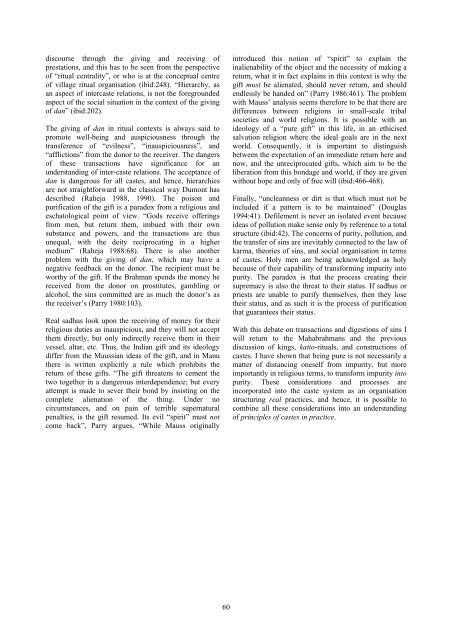
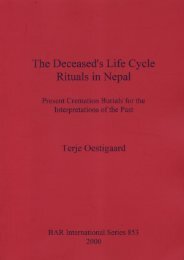


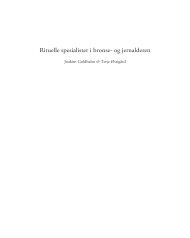
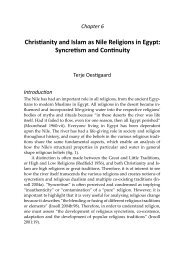
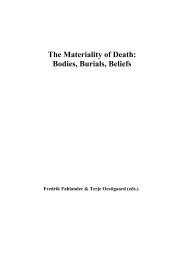


![Fullmono-AK [P2118].indd - oestigaard](https://img.yumpu.com/18994998/1/177x260/fullmono-ak-p2118indd-oestigaard.jpg?quality=85)